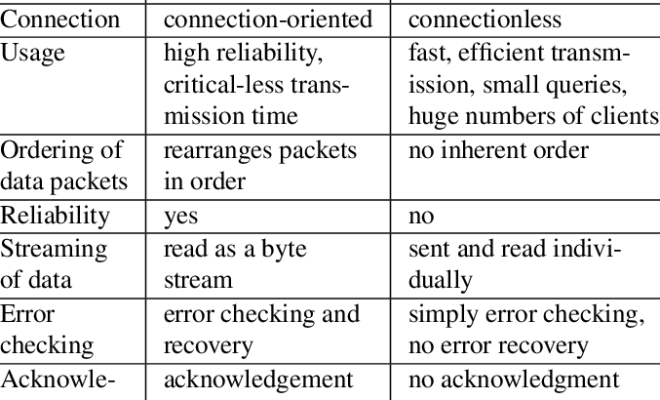Understanding the Differences Between TCP and UDP

When it comes to internet communication protocols, there are two main players: TCP (Transmission Control Protocol) and UDP (User Datagram Protocol). Both TCP and UDP are used for transmitting data over the internet, but they do so in very different ways. In this article, we will explore the key differences between TCP and UDP.
TCP
TCP is a connection-oriented protocol, which means that it establishes a connection between two devices before transmitting data. This connection is then maintained throughout the duration of the data transfer. TCP is reliable and ensures that all data is transmitted in the correct order, without loss or duplication.
TCP also uses a process called flow control to ensure that data is transmitted at a rate that can be handled by the receiving device. This prevents the receiving device from being overwhelmed with data and ensures that the data transfer is smooth and efficient.
However, TCP is slower than UDP because it has to establish a connection before transmitting data. This connection process requires a three-way handshake, which can take time. TCP is also more resource-intensive than UDP, which means that it requires more processing power and memory.
UDP
UDP, on the other hand, is a connectionless protocol. This means that it does not establish a connection before transmitting data. Instead, UDP simply sends data packets to the recipient without any guarantee that they will arrive or be delivered in the correct order.
UDP is faster than TCP because it does not have to establish a connection before transmitting data. It also uses less processing power and memory than TCP, which makes it more efficient for transmitting large amounts of data quickly.
However, because UDP does not guarantee that all data will be transmitted or delivered in the correct order, it is not as reliable as TCP. UDP is commonly used for applications that require speed over reliability, such as online gaming or video streaming.
Conclusion
In conclusion, TCP and UDP are two very different protocols that are used for transmitting data over the internet. TCP is reliable but slower, while UDP is faster but less reliable. The choice between TCP and UDP depends on the specific requirements of the application in question. For applications that require reliability, such as file transfers or email, TCP is the better choice. For applications that require speed, such as online gaming or video streaming, UDP is the better choice.






